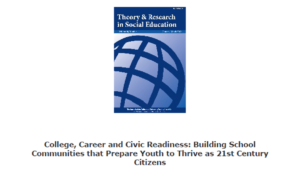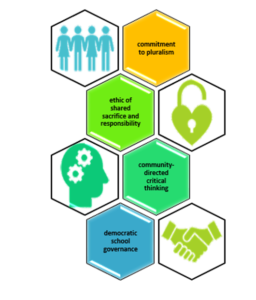Preview of New Article on NYKids’ Research: College, Career and Civic Readiness: Building School Communities that Prepare Youth to Thrive as 21st Century Citizens
By Kristen C. Wilcox, Catherine Kramer, & Amanda Lester
In the United States, advances in information technology, increasing competition in the global marketplace, and social unrest, rooted in longstanding opportunity inequities for people of color and those growing up in poverty, have presented new social and political terrain for young people and educators to navigate.
It is perhaps now more imperative than ever that educators in the U.S. support students with developing what are referred to as “21st Century Skills”
In NYKids’ recent college and career readiness study, we investigated a number of positive outlier schools across New York state to identify key characteristics that distinguish them from schools with expected outcomes. We found that educators in these schools shared a common set of priorities for the skills and sensibilities they sought to develop in the young people in their care.
What Does it Take to Prepare Youth for 21st Century Citizenship?
Findings from the NYKids College and Career Readiness Phase 1 Study indicated a pervasive focus on civic preparation in positive outlier schools, which inspired this subsequent civic focused embedded study.
 Though the schools in this study were selected for their better college and career preparation (as measured by graduation outcomes) educators in positive outlier schools, in contrast to typically performing schools, emphasized student preparation for citizenship alongside college and career preparation.
Though the schools in this study were selected for their better college and career preparation (as measured by graduation outcomes) educators in positive outlier schools, in contrast to typically performing schools, emphasized student preparation for citizenship alongside college and career preparation.
Further, in positive outlier schools, civic education was not limited to instruction in specified courses such as social studies. Rather the inclusion of civic education pervaded the school with a variety of opportunities for young people to critically examine social issues using data and evidence. They were also encouraged to communicate with openness and intent to understand other points of view, collaborate with people of different backgrounds, beliefs, and orientations, and develop new ways of tackling dynamic and complex problems in their schools and communities.
Through an analysis of the ways that civic preparation was integrated as a school-wide priority, trends emerged to show that the positive outlier schools studied aligned with research-based frameworks such as Positive Youth Development (PYD) and Deeper Learning (DL).
While none of the school leaders or educators in positive outlier schools explicitly referenced PYD or DL, the principles of each framework aligned with their core beliefs and priorities that we characterized in these four themes:
(1) commitment to pluralism;
(2) ethic of shared sacrifice and responsibility;
(3) community-directed critical thinking; and
(4) democratic school governance.
A key take-away from this embedded study is that for these positive outlier schools, civic readiness played a central role in what opportunities they offered to young people and complemented efforts to prepare young people for college or career.
 Looking Forward to Unprecedented Challenges
Looking Forward to Unprecedented Challenges
As educators now look ahead to the next school year for ways to implement new instructional design principles that will support and accelerate student learning in a post-pandemic world, the lessons learned from positive outlier schools about the value of civic readiness holds even greater import.
Some practical suggestions for leaders and educators include:
- Focus on social-emotional learning and ensure that staff are asset-based and culturally responsive. The goal here is to support each young person in reconnecting to their school and larger community in a safe/no judgment environment.
- Accelerate content learning and address learning gaps by centering instruction in content-integrated and project-based opportunities, ideally inviting youth to analyze the impact of current societal events and issues in relation to academic content. As a key part of this DL approach, encourage them to identify ways that they can help to address these issues at the local level.
- Engage young people in opportunities to become critical consumers of media and to apply that critical lens through a variety of opportunities for academic and social discourse across content and school-community forums (i.e., student podcasts, student journalism, student activism).
Check out NYKids’ research results page for the College and Career Readiness study and case studies of schools investigated in this study. Also see our resources page for more information on promoting civil discourse and civic engagement.
As always reach out to nykids@albany.edu for your improvement and research partnership needs.
